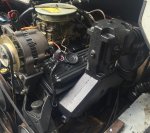OK for rust to form you need three things: exposed iron, water and oxygen. In an engine that has been run for a year all of the exposed iron will be coated with a layer of rust. So in a drained engine block you will have no (or almost no) exposed iron, you will have moisture and if you put the plugs back in, very little oxygen (only that in the air trapped in the engine block) and if any rusting does occur the oxygen will be consumed and will stop. The result would be only an insignificant (a few grams at most) amount of rust. Being cold actually slows rust formation. The hot water that you run through the engine all summer contains a significant amount of O2 (that is what fish breath) and is constantly replenished so it is quite good at causing rust. Now I am not saying that adding antifreeze to prevent corrosion is bad, just that it is unnecessary.
Now some of you say “ I put some antifreeze in the freezer and it froze”. The difference between water and antifreeze is that water expands and causes block damage when it freezes and antifreeze does not, at least to -50 or -100 F depending on what you get. So if you properly drain the block then add antifreeze you will be OK, but if you try to DISPLACE the water with antifreeze by adding it through the outdrive it is a crapshoot. I sure love my 470 this time of year





















